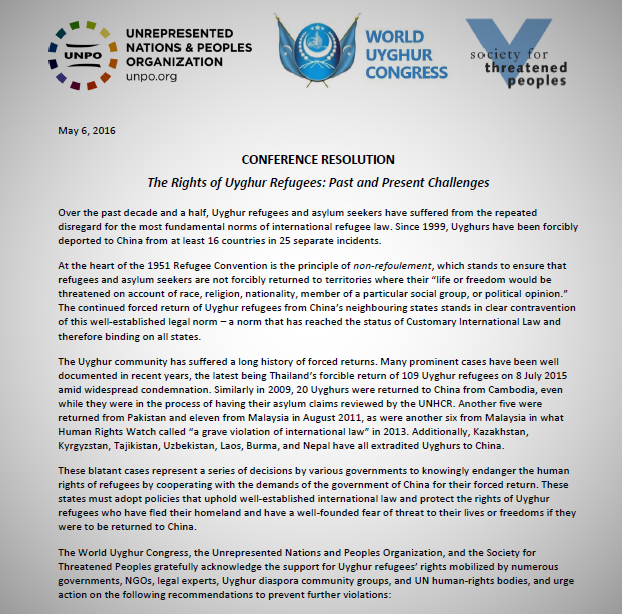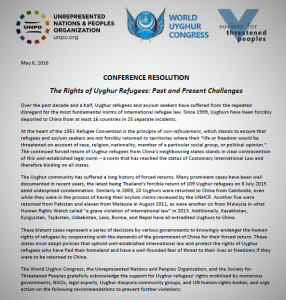Conference Resolution on Uyghur Refugees and Asylum Seekers

WUC, 6 May 2016
World Uyghur Congress – The WUC has released its Formal Resolution for its recent conference regarding the status of Uyghur refugees and asylum seekers, The Rights of Uyghur Refugees: Past & Present Challenges, which can be read here.
Over the past decade and a half, Uyghur refugees and asylum seekers have suffered from the repeated disregard for the most fundamental norms of international refugee law. Since 1999, Uyghurs have been forcibly deported to China from at least 16 countries in 25 separate incidents.
At the heart of the 1951 Refugee Convention is the principle of non-refoulement, which stands to ensure that refugees and asylum seekers are not forcibly returned to territories where their “life or freedom would be threatened on account of race, religion, nationality, member of a particular social group, or political opinion.” The continued forced return of Uyghur refugees from China’s neighbouring states stands in clear contravention of this well-established legal norm – a norm that has reached the status of Customary International Law and therefore binding on all states.
The Uyghur community has suffered a long history of forced returns. Many prominent cases have been well documented in recent years, the latest being Thailand’s forcible return of 109 Uyghur refugees on 8 July 2015 amid widespread condemnation. Similarly in 2009, 20 Uyghurs were returned to China from Cambodia, even while they were in the process of having their asylum claims reviewed by the UNHCR. Another five were returned from Pakistan and eleven from Malaysia in August 2011, as were another six from Malaysia in what Human Rights Watch called “a grave violation of international law” in 2013. Additionally, Kazakhstan, Kyrgyzstan, Tajikistan, Uzbekistan, Laos, Burma, and Nepal have all extradited Uyghurs to China.
These blatant cases represent a series of decisions by various governments to knowingly endanger the human rights of refugees by cooperating with the demands of the government of China for their forced return. These states must adopt policies that uphold well-established international law and protect the rights of Uyghur refugees who have fled their homeland and have a well-founded fear of threat to their lives or freedoms if they were to be returned to China.
The World Uyghur Congress, the Unrepresented Nations and Peoples Organization, and the Society for Threatened Peoples gratefully acknowledge the support for Uyghur refugees’ rights mobilized by numerous governments, NGOs, legal experts, Uyghur diaspora community groups, and UN human-rights bodies, and urge action on the following recommendations to prevent further violations:
To the UNHCR:
- Take substantive steps to render the 1951 Refugee Convention a more meaningful and effective instrument of international law to ensure that its accountability mechanisms are robust enough to hold states to account over clear and recurrent breaches.
- Establish a Supervisory Working Group tasked with the capacity to request information, receive complaints, conduct investigations and report directly to the UN and states to hold states to accountable if they fail to meet their protection obligations under the Refugee Convention. The WUC and others urge the UNHCR to act on already existing recommendations and establish a such a body able to uphold these principles.
- UNHCR officials must recognize and respond to legitimate distrust with the institution among the Uyghur community in particular, following a number of cases where Uyghurs were returned to China after having begun the official asylum process. Many Uyghurs often cannot distinguish between asylum officials and officials representing the state.
To the Chinese government:
- China must observe international law and discontinue its harsh and inexcusable repression of the Uyghur population in East Turkestan – particularly those who have been unjustly detained in the past and continue to face severe consequences upon their release. China remains the primary actor with the ability to address the root causes of Uyghur exodus from the region – namely, religious and cultural restrictions, restrictions on freedom of movement, arbitrary arrests and detentions, extra-judicial killings and enforced disappearances, among other severe and persistent problems.
- The Chinese government must not exert undue pressure on its neighboring states to return citizens who have left as a result of discrimination and repression. In the event that Uyghurs are, in fact, returned to China, it is the responsibility of the Chinese government to ensure their fair and just treatment and that impartial observers are provided unrestricted access.
To other interested states:
- States on China’s border and extended periphery, particularly Thailand and Malaysia, must observe international law with regards to their handling of Uyghur refugees. Neighbouring states cannot continue to return Uyghurs who have fled legitimate persecution and must cooperate fully with the UNHCR and other authorities to ensure the safety and protection of Uyghurs. These states must also take seriously Uyghurs’ desire to continue on to a third country out of China’s reach.
- South East Asian states in particular must take steps to ensure that rampant corruption witnessed by Uyghur refugees is rooted out. Human traffickers currently enjoy a favourable relationship with police and other authorities in the region, which compounds the exploitative ability of both parties towards refugees and other vulnerable persons.
- Other states on China’s border to the west (Kazakhstan, Kyrgyzstan and Tajikistan) must uphold international law and ensure that political and economic considerations, namely the influence of the Shanghai Cooperation Organization, do not trump international law, and do not exert undue influence over decisions relating to refugees and asylum seekers.
- The government of Turkey must recognize the rights of Uyghur asylum seekers who have landed in Turkey. Uyghurs willing to work and to send their children to school must be able to officially register with Turkish authorities to obtain the necessary paperwork that will make this possible.


